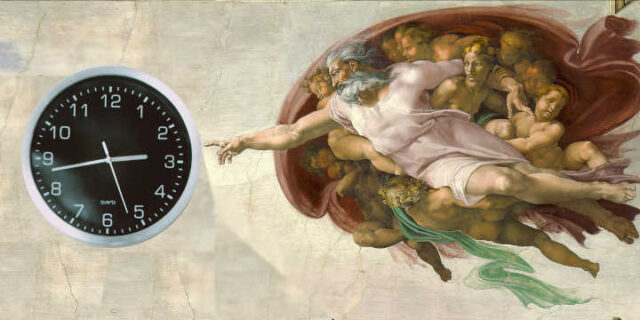Is God free of the constraints of time? If so, does this mean he cannot change, and therefore cannot do anything? But if he is constrained by time, how can he be all-powerful and all-knowing?
I’ve been thinking a little about God and time. I don’t pretend to think that I can understand God. I know everything I think about God is subject to severe limitations. But it is interesting to speculate.
Who cares?
It seems that lots of people think about these questions. Believers try to understand God. Does he know the future, especially my future? How does he answer prayer? What was he doing for eternity before he created the universe?
And unbelievers often feel that these questions show that God is impossible. Certainly I’ve discussed with atheists who believed that God’s omniscience would prevent human freewill.
Philosophers have analysed the questions and have come up with all sorts of ideas (as you’d expect).
Surely God is timeless
It always seem logical to me that God is outside time. After all, cosmologists believe time and space (as well as matter and energy) began at the big bang. So if God created the universe (or the multiverse if you like), then his existence must be outside time, since his existence is “outside” the big bang.
(It is noticeable in these discussions how often we have to put words relating to time and space in inverted commas. Our language is built around our experience of time and space, and it is hard for us to express concepts outside those frames.)
CS Lewis explained it like this. Imagine a large table. The length of the table represents time and the width represents space. (Of course space is 3-dimensional, not 1-dimensional, but this is just a picture.) We live on the table, moving inexorably from one end towards the other. We can’t go back or stop. But God is outside time, standing next to the table and able to view it all at once. He can see Shakespeare writing Hamlet and equally he can see me writing this. He can intervene at any point in our time because he isn’t part of our time.
Thus we can understand (sort of) how God can predict the future. For what is future to us is present to him. His knowledge of our future doesn’t pre-determine our choices because he sees it all in his eternal present.
How else could God be omni-everything? To live in time is to be limited. If God is experiencing this time now he isn’t experiencing some other time. Until that time occurs, but then he is no longer experiencing this present time.
For a long time I was happy with this view. I couldn’t really comprehend God living in an eternal now, but I could see in theory that it made sense, as much as I could comprehend anything about God. But then I had second thoughts.
How can a timeless God create?
It is interesting to ask What is time? It is hard to give an answer that isn’t circular. But however we define time, it seems that it is measured and known by change. It is possible to have time without change, but it is difficult to see how we can have change without time. Change pre-supposes that things were one way in the past but later they changed.
But if God is timeless, how can he act? How could he create the universe?
For if God created the universe, doesn’t that mean there was a state (I dare not say “a time”) when there was no universe, and “now” a state when there is a universe. And surely God can know from experience both states?
What’s more, theologians say God sustains the universe by his continual activity. (I’m not sure I believe that, but it is a common view.) And I believe he reacts to our prayers (by answering them, or not) and actions (e.g. by forgiving our wrongs). So surely these things mean he is involved in time?
Some use another argument. We experience time. We understand what “now” means, that it is continually changing. 17th November was now to me yesterday, but as I write this “now” is 18 November. And tomorrow, “now” will be 19 November. We know and experience “now”. So can we know and experience something God cannot? Does this not indicate that God experiences time?
But I must say I find this argument underwhelming. After all, I experience “sin”, failing to live up to the standards I set myself, let alone the standards God sets. (Yes, dear reader, it’s sadly true!) So there is something that I experience and know that God doesn’t know first hand. But he knows more about it second hand than I do. So I think it could be the same with time. (And I refuse to make a pun about “second hand”!)
The idea of God being within time is the basis for the doctrine, believed by some christians, of Open Theism, which says that God doesn’t know the future, despite him knowing everything. But because the future has hasn’t happened yet, it isn’t a thing that can be known. Open theism is primarily an attempt to reconcile God’s omnipotence and human freewill. I’m not much of a fan of open theism either, as I think it has more problems than the ideas it attempts to explain.
I see other problems with the idea of a temporal God. Mathematicians say we can never count to infinity, and hence we can never count back to minus infinity, nor count forward from minus infinity to now. Since time is the counting of duration, it is impossible for a time-based God to have existed for all eternity. The only way for God to have always existed is for him to exist outside of time. I find this argument quite persuasive.
Nevertheless, the idea of God being dynamic rather than changeless, and hence being in some ways temporal, has attractions.
Is there some other way?
Philosophers have looked at other ways to frame these questions.
Perhaps God exists in his own time. He can see all our time in his present, but he does experience his own time – for example, there was a time in his frame of reference where he said “Let there be light”, and a time before he said it. This idea removes a lot of the difficulties of God being timeless.
But it creates a problem too, the same one we saw earlier. If God exists in his own time, how can he have existed from minus infinity to now? Even after infinite time, you can’t get from minus infinity to now. (But of course, who knows what God can do? Perhaps we can resolve this dilemma by thinking God exists in a timeless frame, but his time is only internal. But perhaps that is just gobbledegook!?)
Another ingenious idea is that time cannot exist until there is matter. And so God was timeless before he created, but now accepts the limitations of being within time as part of his act of creating the universe. It makes God a serving being, which accords with christian thinking. But notice how I’ve had to use temporal words to describe God’s experience “before” creation.
It seems that these ideas try to take the best of the timeless God and temporal God views, but end up with some of the problems of each too. Nevertheless, the positives seem to outweigh the negatives.
Is there an answer?
Some christians seek to answer the questions from scripture, but I don’t think scripture is specific enough to address these issues.
Therefore I think we have to finish where we started, with an admission that we can’t possibly know, we can only speculate. There are enough possibilities to show me that these questions don’t make the idea of God incoherent. But we don’t understand time very well and we can’t really comprehend God, so it all remains speculation.
I definitely think God knows our future and I don’t think that pre-determines us (rather our choices determine his knowledge). And if I had to pick a view, I think I’d go with the idea of God being timeless, but perhaps he experiences change internally. Whatever that means!
Two more questions
How should we understand eternal life?
“Eternal” in the Bible doesn’t mean “forever”, but rather “in the age to come”. But the question remains, if there’s an afterlife (as I believe), is it a timeless existence where we don’t actually do anything? But if it’s an existence of action, won’t we run out of things to do in an everlasting life?
I considered this dilemma in Would eternal life be impossibly boring?, but I wasn’t able to resolve it.
Two theories of time
Philosophers have defined two different theories of time. In A-theory sees time in terms of past, present and future, so that “now” has objective meaning and the past and future don’t actually exist. B-theory considers time in terms of before and after, all times are equally real and “now” has no objective meaning (it is just in our minds).
It turns out that God’s timelessness is considered to fit better with B-theory while the more popular A-theory better fits the idea of a temporal God. I must say I’m not clear about that, since I tend more towards timelessness and A-theory.
But what would I know? 🙂
Read more
- God and Time. Gregory E. Ganssle, Internet Encyclopedia of Philosophy.
- Eternity in Christian Thought. Natalja Deng, Stanford Encyclopedia of Philosophy.
- Scriptural Teaching on God and Time. William Lane Craig, The Good Book Blog, Biola University.
- Would eternal life be impossibly boring?. On this website.
Photo: Michaelangelo’s Creation of Adam (Wikipedia), clock photo by Lisa from Pexels, put together by unkleE.





Hi Eric.
This is a really good subject and its one I’m only just thinking about.
The only two pence I can give this is to state it makes sense to me that God “transcends” time, rather than exists within or without it. It makes more sense to me to say He is both within and without (and I would like to acknowledge my panentheism bias). That stated, I think I can understand your time A-theory preference as that would be my natural preference too.
Yeah, “transcends time” is a good idea, though like most ideas in this, I can’t say I can really understand it. Glad it might have added something to your own thinking.